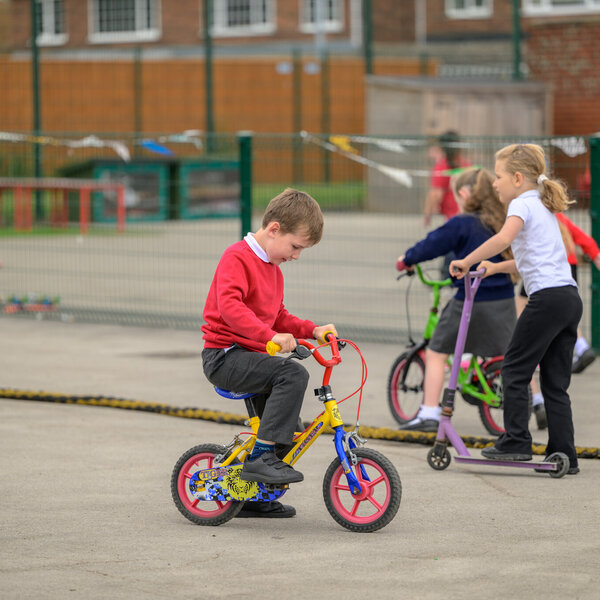Outdoor Play and Learning (OPAL)
We believe that all children need opportunities to play that allow them to explore, manipulate, experience, and affect their environment. We believe play provision should be welcoming and accessible to every child, irrespective of gender, sexual orientation, economic or social circumstances, ethnic or cultural background or origin, or individual abilities.
The OPAL Primary Programme rationale is that “… better, more active and creative playtimes can mean happier and healthier children, and having happier, healthier, more active children usually results in a more positive attitude to learning in school, with more effective classroom lessons, less staff time spent resolving unnecessary behavioural problems, fewer playtime accidents, happier staff and a healthier attitude to life.”
At Eastfield Primary Academy, we believe that all individuals are nurtured to flourish, and our aim is for our young people to leave us as resilient and independent learners that have access to a toolkit of skills that they can adapt and use for the next stage in their education. OPAL supports our three drivers (pride, collaboration & understanding) by ensuring that children can play collaboratively and have the opportunity to make sense of their learning and the world around them through play - children are encouraged to make the most of every minute in school!
Value of Play
We believe play has many benefits, including:
ü Play is critical to children’s health and wellbeing, and essential for their physical, emotional, social, spiritual, and intellectual development.
ü Play enables children to explore the physical and social environment, as well as different concepts and ideas; supporting children’s understanding of both the world around them and their learning in the classroom.
ü Play enhances children’s self-esteem and their understanding of others through freely chosen social interactions, within peer groups, with individuals, and within groups of different ages, abilities, interests, genders, ethnicities, and cultures, supporting collaboration in the classroom.
ü Play requires ongoing communication and negotiation skills, enabling children to develop a balance between their right to act freely and their responsibilities to others.
üPlay enables children to experience a wide range of emotions and develop their ability to cope with these, including sadness and happiness, rejection and acceptance, frustration and achievement, boredom and fascination, fear, and confidence.
üPlay encourages self-confidence and the ability to make choices, problem solve and to be creative.
ü Play maintains children’s openness to learning, develops their capabilities and allows them to push the boundaries of what they can achieve.
üPlay and exploration of materials allows children to take risks and manage risks in a controlled space, supporting children to understand the limits of their own capabilities, skills that can be transferred into the wider world and adulthood.
üPlay encourages a sense of collective responsibility in caring for each other, the school grounds and the available materials and resources; everyone is part of the Eastfield family and the wider global community.
üPlay offers the children the opportunity to be with other children in close proximity and to reduce the impact of COVID-19 on their physical, emotional and mental well-being.
üPlay further enhances our outstanding Personal Development offer (Ofsted Nov, 2023).
Aim
Our aim is to:
üEnsure play settings provide a varied, challenging and stimulating environment.
ü Allow children to take risks and use a common-sense approach to the management of these risks and their benefits.
ü Provide opportunities for children to develop their relationships with each other; collaboration.
üEnable children to develop respect for their surroundings and each other; pride.
üAid children’s physical, emotional, social, spiritual and intellectual development.
ü Provide a range of environments that will encourage children to explore and play imaginatively.
ü Provide a range of environments that will support children’s learning across the curriculum and learning about the world around them; understanding.
ü Promote independence and teamwork within children.
ü Build emotional and physical resilience.
Clothing
It is important that all staff and children come prepared for outdoor/ all weathers play every day:
üCold and wet weather - wellies should be worn by staff and children when walking on the school field. Children should also wear coats during cold weather. Children need to be responsible for managing their outdoor clothing independently. This includes being prepared, before they go outside to play.
ü Hot weather - children will need sun cream and hats to protect themselves.
Part of outdoor play means children may get muddy. We will endeavour to reduce this as much as possible but free play means allowing our children to explore the areas they like. A uniform is designed to give children a sense of belonging but also a way to protect their ‘good’ clothes they wear at home.
We have a small stock of wellies and spare coats available for children to use, to ensure that all children have access to the outdoor environment during cold and wet weather.
We strive to ensure that our children enjoy their time outside through wide variety of resources and equipment that we provide enabling them to engage in imaginative play!
